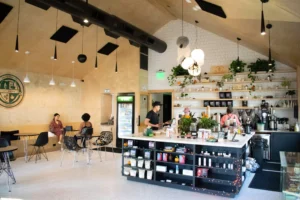Two people walk inside a charming little coffee shop, their discussion mingling with the gentle buzz of the establishment and filling the air with the perfume of freshly brewed coffee. They step up to the counter and give the barista a small nod as they place their order.
Please, five coffees. Two hanging and two for us.
The exchange happens quickly, and the remarks seem rather commonplace. After taking their two cups and enjoying the warmth in their hands, they go, leaving three “hanging” coffees behind. I had to ask the barista what this strange term meant because it intrigued me.

“What’s the deal with hanging coffee cups?” With curiosity peaked, I asked.
The barista smiled gently and said, “Wait and you’ll see.”
Going back to my seat, I sipped my coffee and contemplated the possible meaning of this. Two young women entered shortly after, approaching the counter and conversing animatedly. They did not mention a “hanging” drink as they paid for their two coffee orders and departed. Not long after, another party arrived—three women with a larger order.
“Seven cups of coffee. Three for us and four hanging.”

Again, they paid, received their drinks, and walked out, leaving behind the extra four “hanging” coffees. Despite my confusion, I chose to wait because I thought something significant was going to happen.
Then the door opened and a weary-looking man wearing tattered clothes emerged. His jacket was threadbare, his shoes scuffed, and he had a somber manner, as if life had taken a toll on him. He approached the counter and asked softly, “Do you have a coffee hanging?”
The barista responded promptly and politely. “Yes, sir, we do.”
The man was given a warm cup of coffee shortly after, and he accepted it gratefully, his hands shaking a little as he raised it to his lips. He was not required to pay, therefore he didn’t. The coffee had already been purchased—by a stranger who had shown him a modest act of kindness beforehand. I got it right then and there.

This was the idea behind the lovely custom known as “hanging coffees,” in which individuals buy one or more extra coffees and leave them “hanging” for a less fortunate person. Without guilt or condemnation, someone who cannot afford to buy their own could still take pleasure in the straightforward comfort of a hot beverage. It was a silent act of kindness shared by strangers bound together by an unseen compassionate thread.
I was struck, as the man sat down with his coffee, by the silent strength of this gesture. What had appeared to be a vague idea now made perfect sense. It was more than simply a cup of coffee—it was a symbol of human decency, a way for people to look out for one another, even without knowing who would benefit from their kindness. This was a little, impromptu gesture of community rather than charity in the classic sense.
The tradition of hanging coffees, or “caffè sospeso”, originated in Naples, Italy during hard economic times. It began as a way for wealthier patrons to leave an extra coffee for someone in need, and over time, it grew into a symbol of solidarity. From its humble beginnings in Neapolitan coffee shops, the tradition has expanded over the world, to cafés in bustling cities and rural towns alike. And it isn’t confined to coffee anymore. People can leave meals, sandwiches, or even groceries hanging in a lot of places.
The idea’s simplicity is what makes it so beautiful. There’s no big reveal, no obligation to say thank you or acknowledgement. Although paying for a hanging coffee is a silent task that is part of daily life, it can have a significant impact. It serves as a reminder that even seemingly insignificant actions can have a big impact by giving warmth and comfort to someone who may be experiencing hardship.

Watching the man drink his coffee while I sat in the café made me think about how great it would be if more people followed this tradition. How simple it would be to bring it into our own neighborhoods and establish areas where anybody could find a little break from the grind, no matter what their situation. Even though a cup of coffee might not seem like much, it could mean the world to someone who is in need. It serves as a reminder that kindness, in all of its manifestations, has the capacity to affect the world in ways that are beyond our comprehension.
Wouldn’t it be fantastic if we all started doing this in our cities and towns? Maybe this modest, silent deed of kindness will encourage others to follow suit, starting a chain of kindness that will go far beyond a single cup of coffee. One coffee, one sandwich, one small act of kindness at a time—perhaps we could all give it a shot. And in doing so, we might just make the world a little bit warmer for someone else.


